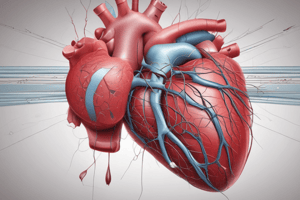Podcast
Questions and Answers
What type of aortic dissection may require femoral, innominate or right axillary arterial cannulation?
What type of aortic dissection may require femoral, innominate or right axillary arterial cannulation?
- Degenerative aortic aneurysm
- Chronic Type A
- Acute Type A (correct)
- Type B
What is one benefit of femora-femoral or axillo-femoral CPB?
What is one benefit of femora-femoral or axillo-femoral CPB?
- Reducing the risk of atheroembolism
- Increasing cerebral perfusion pressure
- Restoring anterograde flow
- Permitting systemic cooling prior to sternotomy (correct)
Why may cannulation of the mid or distal aortic arch be required?
Why may cannulation of the mid or distal aortic arch be required?
- To permit systemic cooling
- To ensure adequate cerebral venous drainage
- To reduce the risk of atheroembolism (correct)
- To restore anterograde flow
What is necessary for retrograde cerebral perfusion (RCP) with reversal of blood flow in the superior vena cava?
What is necessary for retrograde cerebral perfusion (RCP) with reversal of blood flow in the superior vena cava?
What is the purpose of bicaval cannulation in anterograde cerebral perfusion?
What is the purpose of bicaval cannulation in anterograde cerebral perfusion?
What is the potential consequence of inadequate cerebral venous drainage in anterograde cerebral perfusion?
What is the potential consequence of inadequate cerebral venous drainage in anterograde cerebral perfusion?
What is the term for the technique of core cooling combined with cessation of blood flow?
What is the term for the technique of core cooling combined with cessation of blood flow?
What is the primary reason for using deep hypothermic circulatory arrest in certain surgeries?
What is the primary reason for using deep hypothermic circulatory arrest in certain surgeries?
What is the benefit of reducing the body temperature to 30°C during surgery?
What is the benefit of reducing the body temperature to 30°C during surgery?
Who demonstrated that a reduction in body temperature to 30°C increased the period of 'safe’ cerebral ischemia?
Who demonstrated that a reduction in body temperature to 30°C increased the period of 'safe’ cerebral ischemia?
What was used for surface cooling in early experiments?
What was used for surface cooling in early experiments?
What is the term for the temporary stopping of the heart during surgery?
What is the term for the temporary stopping of the heart during surgery?
What type of pump is preferred in DHCA to reduce damage to cellular components and hemolysis?
What type of pump is preferred in DHCA to reduce damage to cellular components and hemolysis?
What is the primary purpose of incorporating a hemofilter in the extracorporeal circuit during DHCA?
What is the primary purpose of incorporating a hemofilter in the extracorporeal circuit during DHCA?
Why is a cardiotomy reservoir of sufficient capacity selected in DHCA?
Why is a cardiotomy reservoir of sufficient capacity selected in DHCA?
What is the approximate energy required to warm a 70-kg adult from 20°C to 37°C?
What is the approximate energy required to warm a 70-kg adult from 20°C to 37°C?
Why is consideration given to the use of heparin-bonded circuits in DHCA?
Why is consideration given to the use of heparin-bonded circuits in DHCA?
What is the average specific heat capacity of human tissue?
What is the average specific heat capacity of human tissue?
Flashcards are hidden until you start studying




